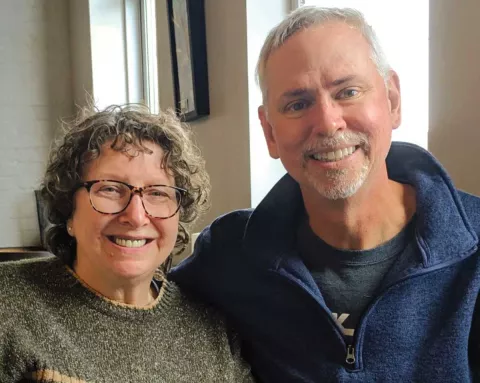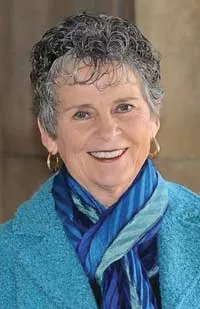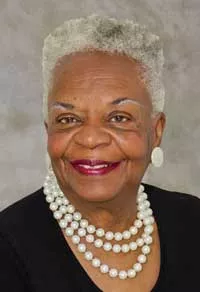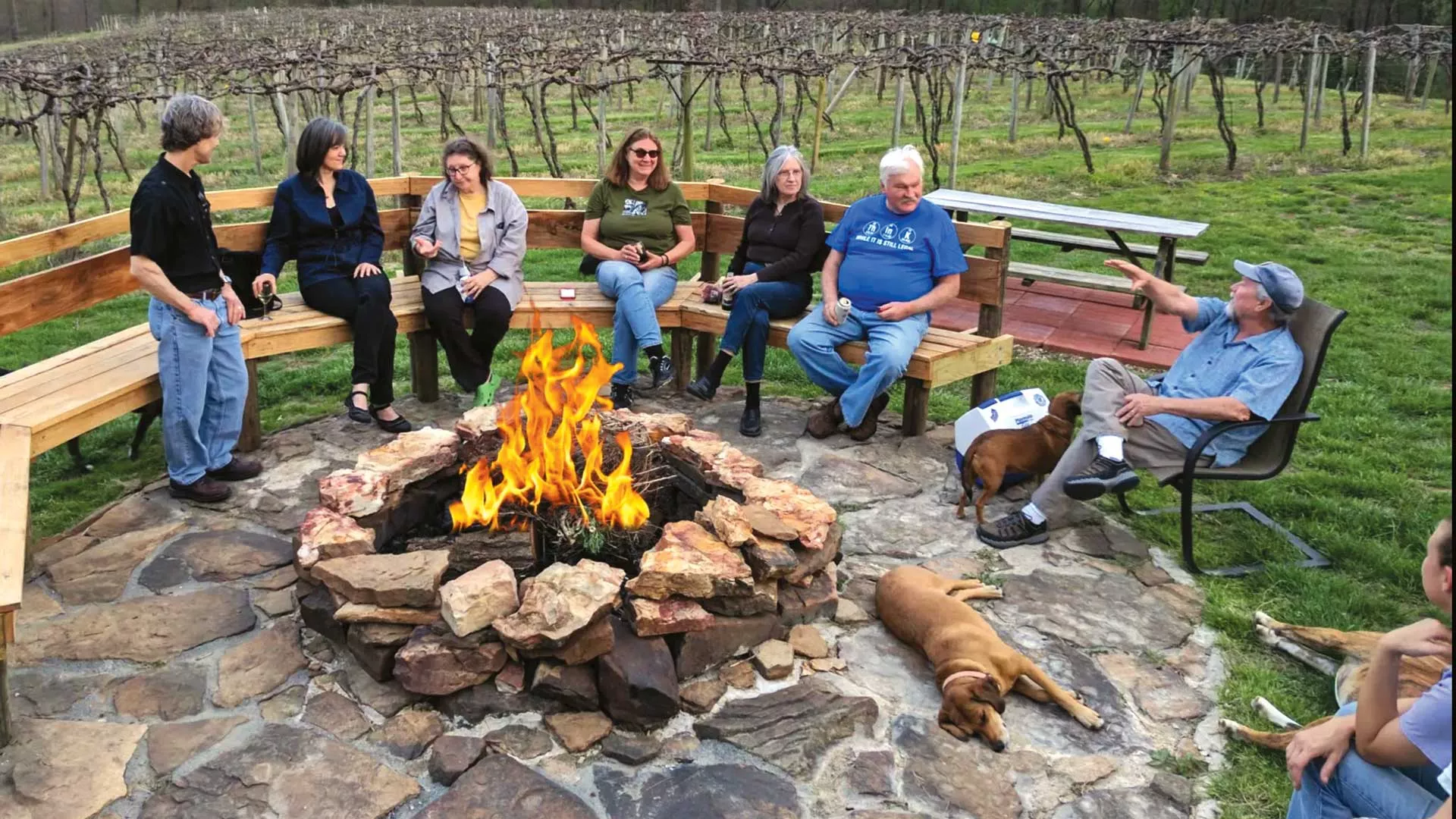
Jon and Carla Womack
Campground owners, Pomona, Illinois

For the Womacks, the road to succeeding at a business they love started with a disappointment.
They had purchased eight acres of forested land in the countryside near Pomona, where they had planned to build a home for their retirement. At the time, both were teaching near DeKalb, Ill.; Jon as a Spanish teacher, and Carla in special education.
They cleared the land but then had trouble getting the well drilled and the electricity hooked up.
“We ran into roadblocks every step of the way,” Jon says.
One day, on a scenic drive home from the country, they passed a property with a straw bale house that they had long admired. This time, it had a for sale sign in front.
“It didn’t take us long to decide to make an offer—and the property was ours,” Jon says. “It turned out that was the best thing that could have happened.”
They acquired the property along with 33 adjacent acres in 2018, though they were still unsure of what to do with the land. Then Jon went on a camping trip, and the idea came to him: They would build a campground.
Doing most of the heavy lifting himself, Jon leveled the campsites, wired electricity to some of them, chopped a lot of firewood, and created two gathering places and boccie courts.
By 2019, the campground, newly minted as the Wine Trail Wilderness, was ready to receive guests. To get the word out, they listed with the online booking platform Hipcamp (bit.ly/Hipcamp_WineTrail), which is like an Airbnb for campgrounds across the country.
Thanks to their scenic location near the 11 wineries that dot the Shawnee Hills Wine Trail, the business took off.
“The pandemic was a boon for campgrounds because people were looking for alternative ways to travel where they could remain isolated,” Jon says. Today, Wine Trail Wilderness is recognized as a top location among Hipcamp properties and in Forbes magazine.
“It is a great way to meet all kinds of people, but I also just love being outside and working on the house and the property,” he adds. “Having so many problems with that other property turned into a good thing.”
Their advice: Have a plan, but be prepared to adjust. Take advantage of new opportunities, but pursue them with care. It will require hard work and learning, and it will be worth it.

Mary Ann Stallings
Elder care consultant, Lincoln, Nebraska
As Stallings neared her retirement from teaching, she and her husband were faced with helping several elderly family members—his parents, her mother, and an aunt and uncle—find places to live.
“It was frustrating and time-consuming,” she says. “We really felt the sting of … still working and having a family, but beginning to help make decisions for parents.”
In 2010, about a year before her retirement from Lincoln Public Schools, Stallings launched Bridge to Better Living (bridgetobetterliving.com), a consultancy that connects families with living arrangements for their aging loved ones.
Today, the business is thriving, with five consultants and connections with 25 retirement communities throughout Lincoln, Omaha, and eastern Nebraska.
The consultants pre-screen applicants and work with families to overcome common reluctance. Stallings contracts with communities, so it’s a free service for the clients.
In the beginning, however, success was not guaranteed.
“I was nervous about getting financial support, but felt confident about my concept,” Stallings says.
She developed a business plan and determined how much funding the business would need.
“I went to the bank, and in 25 minutes, I had a $25,000 Small Business Administration loan, which is what I needed to get started,” she recalls.
At first, Stallings ran the business out of her home. Later, she moved to an entrepreneur center, where she could gain information from experts and others starting out. Now the business operates out of dedicated office space.
“I love seniors. I grew up on a farm, and people where I lived were advocates for older family members. I’m so happy I can now help seniors and their loved ones,” she says. “Bridge to Better Living has been the frosting on the cake for my career. It’s very rewarding watching the weight of the world come off people’s shoulders.”
Her advice: Think about how you will stand out and succeed. Make sure you have a detailed business plan. Stick to it, but revise when necessary.

Gloria Jenkins
Day care center owner, Atlanta, Georgia
“I saw so many children who weren’t being taught basic skills before they entered school, and I thought I could do better,” says retired special education teacher Gloria Jenkins.
That’s what inspired her to run a day care center—one of a long list of efforts she has undertaken as an educator, advocate for racial justice, and entrepreneur.
She took over her first daycare center in 1986, and opened a second one after retiring in 2002, eventually enrolling about 100 children.
Jenkins attributes her leadership skills to her role models: Her grandmother, who established the first school for Black children in Florence County, South Carolina; and her mother, who then became one of the school’s first teachers.
Jenkins herself has been deeply involved in civil rights—participating in sit-ins in college and then, in 1963, organizing a civil rights group in Sumter.
She started working as a teacher in Atlanta, in 1970, but she continued her social justice work as well as her side businesses.
Nearly all students from her day care centers who entered public schools remained on the honor roll throughout elementary school. Special education students adapted particularly well, Jenkins reports.
“One of my goals was to help every student thrive, but also identify students with special needs earlier so they could get the support they needed in my schools and later in public schools, so years wouldn’t be wasted,” she explains.
Eventually, Jenkins branched out into other businesses as well, including running a gift shop and a bed and breakfast.
“It is a shame to go through life and just have one interest or one career,” Jenkins says. “There are so many things you can do, and it is such a good way to keep you active.”
Today, she has reduced her business interests, but continues to advocate for voting rights in Georgia, a state that has become a flash point in the last two national elections.
She created the Seniors Reaching Seniors program, in which members visit senior facilities to educate residents about voting and other services.
“I believe I have made a difference and can continue to,” she adds.
Her advice: Find your passion, stick with it, and enjoy it. Owning a business is hard work, but it will pay off in the satisfaction you gain.

Robert Becker
Toy inventor, St. Louis, Missouri

A retired chemistry teacher and former Missouri Teacher of the Year, Becker has found a new identity in his retirement—as a toy inventor!
In 2021, soon after retiring, he invented HyperTiles (hypertiletoy.com), a construction toy that allows kids to create distinct shapes with connectible plastic hyperbolic paraboloids. What’s that, you ask? Imagine saddle-shaped surfaces, kind of like stacked potato chips in a can, if you could twist and move them without breaking them.)
The germ of the idea had been with Becker since 1982, when he took a college course in 3D design. Later, the idea took shape, so to speak, as he learned about the versatility and flexibility of hyperbolic paraboloids.
Becker’s students pitched in, helping him learn the ropes of 3D printing and test early prototypes. He also developed a Kickstarter campaign, which was expected to raise $5,000, but met that goal in only seven hours. In total, the campaign raised $15,000 from 230 supporters.
Becker has learned about production, shipping, and marketing. A friend who is a businessman also helped advise him. And Becker sought help from Square One, an organization for entrepreneurs.
“I have had good luck and the right support at the right times,” Becker says. “I am just learning as I go, but I’m happy to be doing something I love and seeing it grow. I’m having a blast.”

He now sells HyperTiles nationwide, travels to trade shows, and gives presentations to educators and others working with young people.
The toys also have adult fans—mostly artists, mathematicians, and physicists, who buy them to explore concepts visually.
“I really loved teaching, but when I retired, I wanted to do something entirely different,” Becker says. “I still get to work with people and see young people imagine and explore, which is what I tried to do as a teacher.”
His advice: Take well-conceived risks and expect there will be failure that offers you lessons.
“Keep it about people and relationships, which will benefit the business and make it worthwhile for you,” he advises.




